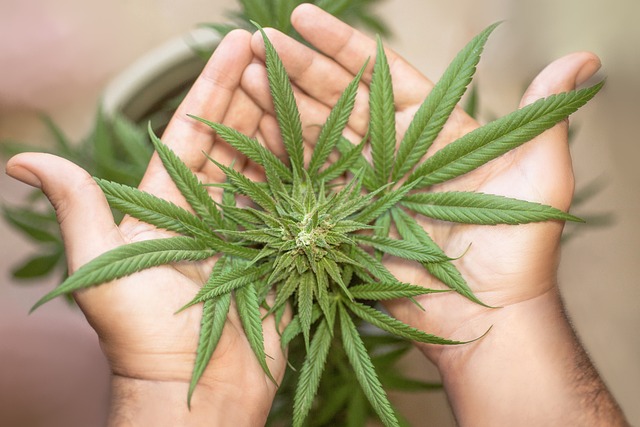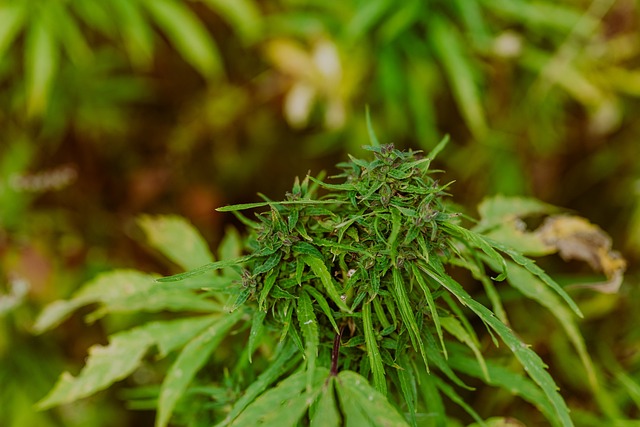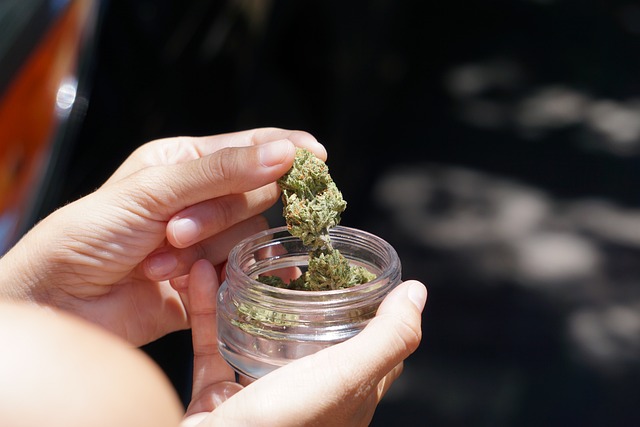THCA infused edibles, a non-psychoactive form of cannabinoid found in cannabis plants, have gained popularity due to their potential therapeutic benefits, including relaxation and pain relief. These products are now widely available as various treats like gummies, chocolates, and baked goods, catering to consumers interested in the health advantages of cannabinoids without psychoactive effects. The emergence of THCA flower has further diversified the market, offering a variant with similar benefits but no high. As the industry evolves, it emphasizes quality, purity, and innovation, with an increasing focus on the therapeutic potential of these edibles for sale. The burgeoning interest in THCA underscores its role in the cannabis landscape, highlighting its complex pharmacological properties and the industry's commitment to exploring its health benefits. Consumers are advised to approach THCA infused edibles with caution, considering individual differences in response due to personal physiology and metabolism. It is important to start with low doses to understand one's sensitivity and to buy from reputable sources for consistent quality and safety. Ongoing research continues to shed light on THCA's effects, particularly its potential impact on mood regulation, anxiety, and cognitive function, making informed decision-making crucial for consumers considering these products for therapeutic or recreational use.
Exploring the nuanced effects of THCA infused edibles, this article delves into the emerging phenomenon within the cannabis market. As THCA, the non-psychoactive precursor to THC, gains traction in product formulations, understanding its potential side effects becomes paramount for consumers. From its legal status to dosage considerations, we navigate through the myriad aspects of THCA’s impact, highlighting how it compares to Delta-9 THC and interacts with terpenes and medications. This comprehensive guide aims to inform on best practices for safe use, identifying high-quality products, and making informed decisions when purchasing THCA infused edibles for sale. Join us as we dissect the science behind THCA and its side effects, ensuring a well-rounded understanding of this cannabinoid’s place in the cannabis landscape.
- ThCA Flower and Its Emergence in the Cannabis Market
- Understanding THCA: The Precursor to THC
- Potential Side Effects of THCA Infused Edibles
- Dosage and Tolerance: Key Factors Influencing THCA Side Effects
- Psychological Impact of THCA Consumption
- Physical Effects of THCA-Infused Products
ThCA Flower and Its Emergence in the Cannabis Market

ThCA, or Tetrahydrocannabinolic Acid, is a cannabinoid found in the cannabis plant that has gained attention for its potential therapeutic properties. As research continues to unfold, ThCA infused edibles have emerged as a popular choice among consumers seeking the benefits associated with this non-psychoactive compound. The emergence of ThCA flower in the cannabis market represents a significant shift from the traditional focus on THC and CBD. This shift is driven by consumer demand for products that offer wellness benefits without the psychoactive effects typically associated with THC. ThCA infused edibles, such as gummies, chocolates, and baked goods, are now readily available for sale, catering to a broad spectrum of users who are intrigued by the potential health benefits of cannabinoids. The rise of ThCA in edible form is indicative of the cannabis industry’s ongoing innovation and responsiveness to consumer wellness trends. As these products become more mainstream, their availability continues to expand, allowing for a diverse range of choices for those looking to incorporate ThCA into their health regimen. The market for ThCA infused edibles is growing, with many producers focusing on quality, purity, and the therapeutic potential of their offerings. This trend underscores the evolving landscape of cannabis consumption and the increasing recognition of the importance of diverse cannabinoids in promoting overall well-being. As such, ThCA flower’s presence in the market is a testament to the plant’s complex pharmacological profile and the industry’s commitment to harnessing its full potential for health and wellness.
Understanding THCA: The Precursor to THC

Delta-9-tetrahydrocannabinolic acid, commonly known as THCA, is a naturally occurring compound found in the cannabis plant that serves as the precursor to the more well-known psychoactive substance, delta-9-tetrahydrocannabinol (THC). As interest in cannabinoids continues to surge, THCA infused edibles for sale are becoming increasingly available, offering a range of potential benefits without the immediate psychoactive effects associated with THC. These edibles are crafted to harness the therapeutic properties attributed to THCA, which include anti-inflammatory and neuroprotective effects, as well as its potential role in managing nausea and pain.
Research into THCA has revealed that it may possess a unique set of characteristics distinct from those of THC. For instance, THCA interacts with the body’s endocannabinoid system in a way that could influence mood and appetite without the ‘high’ typically caused by THC. This has led to a growing interest among consumers seeking alternatives for wellness and health maintenance. As the market for cannabis-derived products expands, discerning consumers are turning to THCA infused edibles for sale as a way to experiment with the potential benefits of this non-psychoactive cannabinoid. Retailers and manufacturers are responding to this demand by offering a variety of THCA-rich edible options, ranging from gummies and chocolates to baked goods and beverages, ensuring that consumers have access to a diverse array of choices to suit their preferences and needs.
Potential Side Effects of THCA Infused Edibles

Consuming THCA-infused edibles, which are available for purchase online and in select retail locations, can lead to a range of effects due to the presence of tetrahydrocannabinolic acid, a non-psychoactive precursor to THC. It’s important to approach these products with caution, as individual reactions can vary significantly. Common side effects may include dizziness, lethargy, and altered mood, which can manifest as either euphoria or anxiety, depending on the dosage and the user’s sensitivity. Due to the way THCA interacts with the body’s endocannabinoid system, some users may also experience dry mouth or eyes, a decrease in blood pressure, leading to lightheadedness, or an increase in heart rate. It’s advisable to start with a low dose and wait for its effects before considering ingesting more, as the onset of effects from THCA-infused edibles can be slower than inhaled cannabis due to the digestion process. Users should also be mindful of their environment and refrain from operating heavy machinery or driving until they are certain of how the edibles affect them, given that THCA’s psychoactive metabolite, THC, can significantly impair such activities. Additionally, those with pre-existing health conditions should consult healthcare professionals before trying THCA infused edibles for sale, as interactions with medications could occur.
Dosage and Tolerance: Key Factors Influencing THCA Side Effects

When exploring the effects of THCA, or tetrahydrocannabinolic acid, a non-psychoactive precursor to THC found in cannabis and hemp plants, understanding dosage and individual tolerance is paramount. THCA infused edibles for sale have gained popularity due to their potential therapeutic benefits and milder psychoactive properties compared to delta-9 THC. The side effects associated with THCA can vary greatly depending on the dosage consumed; thus, it’s crucial to approach its consumption with caution.
For starters, the human endocannabinoid system is highly individualized, with varying receptor sensitivities and responses. Consequently, what may be a tolerable dose for one person could be overwhelming for another. Factors such as body weight, metabolism, and personal physiology all play significant roles in how THCA affects an individual. It’s also important to consider the method of consumption, as edibles undergo a different metabolic process compared to inhaled cannabis, leading to prolonged effects due to the way the body processes and breaks down these compounds.
When it comes to THCA infused edibles for sale, users should start with a low dose to gauge their reaction and increase gradually as needed. This approach helps minimize potential side effects such as anxiety, dizziness, or paranoia, which can be exacerbated by higher doses. It’s also advisable to consume THCA infused edibles in a controlled environment until familiarity with its effects is established. Additionally, purchasing from reputable sources ensures the product’s potency and safety, contributing to a more predictable experience and reduced risk of adverse reactions.
Psychological Impact of THCA Consumption

Consumption of THCA-infused edibles has garnered attention for its potential psychological effects. Tetrahydrocannabinolic acid (THCA), which is the raw, non-psychoactive form of THC found in cannabis plants, has been shown to interact with the body’s endocannabinoid system. Preliminary research suggests that THCA may exert a biphasic effect on mood and cognition; at lower doses, it could promote feelings of relaxation and well-being, while higher doses might induce anxiety or paranoia in some individuals. This dual nature of THCA’s psychological impact underscores the importance of dose titration and individual sensitivity when consuming THCA-infused edibles. Users reporting a sense of euphoria and improved mood are often drawn to THCA products for their potential therapeutic benefits, particularly in managing stress and enhancing focus. However, it is crucial for consumers to approach these products with caution, as personal tolerance levels can vary significantly.
The psychological impact of THCA consumption is a subject of ongoing research, with studies exploring its effects on mood regulation, anxiety relief, and cognitive function. As THCA-infused edibles become more readily available for sale, both the scientific community and consumers are increasingly curious about their potential benefits and side effects. It is essential for individuals to consult with healthcare professionals before incorporating these products into their wellness routines, especially given the varying legal statuses of cannabis-related substances across different regions. Understanding the nuances of THCA’s effects on the psyche can help consumers make informed choices and prioritize safety when exploring the offerings of THCA-infused edibles in the marketplace.
Physical Effects of THCA-Infused Products

THC acid (THCA), the precursor to THC found in cannabis plants, has garnered attention for its potential effects when consumed in infused products. While THCA itself does not intoxicate like its metabolite THC, it is being researched for its therapeutic properties. When THCA-infused edibles are ingested, they can produce a range of physical effects. Users may experience relaxation and pain relief, which is particularly beneficial for those seeking alternatives to pharmaceutical pain medication. Additionally, some consumers report an anti-inflammatory effect, which could be attributed to THCA’s interaction with the body’s endocannabinoid system. Gastrointestinal effects such as increased appetite can also occur due to THCA’s influence on the CB1 and CB2 receptors. It is important for consumers to be aware that the effects of THCA-infused edibles can vary based on individual physiology, the dose consumed, and the specific formulation of the product. Those interested in purchasing these products should seek reputable sources offering THCa infused edibles for sale, as the quality and potency can significantly affect the experience. It is also advisable to start with a low dose to gauge individual sensitivity and effects before increasing the dosage gradually.
In recent years, THCA flower has garnered attention within the cannabis industry due to its unique properties and potential benefits. As this article has explored, THCA, the non-psychoactive precursor to THC, is present in various THCA infused edibles for sale and offers a distinct experience from its psychoactive counterpart. While THCA can provide a range of effects from both psychological and physical perspectives, it’s crucial to approach its consumption with careful consideration of dosage and personal tolerance. Users should be aware of the potential side effects associated with THCA infused edibles, which can include mild to moderate psychoactive effects, as well as the less common but notable physical reactions. As the market for these products expands, it is essential for consumers to remain informed and cautious, ensuring a safe and enjoyable experience with THCA-infused products.
